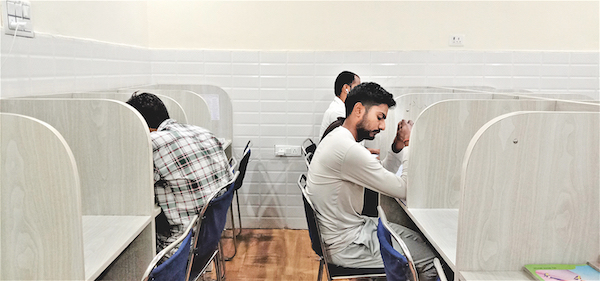Ganauli
This is a collection of articles archived for the excellence of their content. |
Gram pathshalas
As in 2021
Sharmila Bhowmick, February 28, 2021: The Times of India

From: Sharmila Bhowmick, February 28, 2021: The Times of India
The cops who became ‘angel investors’ and started a library movement
GHAZIABAD: Ghaziabad: Philanthropy that can make a difference does not always need a grand scale and a tycoon with a fortune to spend. During last year’s lockdown, around 130 police constables living in and around a Ghaziabad village called Ganauli contributed Rs 5,000 each to set up a ‘gram pathshala’ — essentially a free-of-cost public library with textbooks and study material — to help local students access study material for higher education and competitive exams. Today, these ‘gram pathshala’ have become a movement – they have spread to eight districts, including Kudi Khera in Noida. The driving force was Lal Bahar, a former Delhi Police sub-inspector who works with the National Human Rights Commission. Bahar, now in his late 40s, sees a satisfying career ahead of him but the path wasn’t easy, he said, adding all he wanted to do was make life a little easier for kids in Ganauli. Once the Ganauli pathshala was set up, Bahar and some others reached out to people they knew in other parts of UP.
Bahar said the idea to start the pathshala came from the struggles he faced during his student days while preparing for the police entrance exams. “There are no such study centres in villages. There is no bandwidth for high-speed internet, not everyone has smartphones, and there are hardly any coaching centres. Families have grown and the space is limited — where would children get the opportunity to focus, study and prepare for competitive examinations? These thoughts were the basis for the idea of a gram pathshala. It has grown out of Ganauli to become a mission for us,” Bahar told TOI.
Sonu Baisla (34), a Delhi police sub-inspector who joined hands with Bahar to launch the initiative, said he tested positive while on Covid-19 duty and returned home to Ganauli after treatment in June last year, where he saw children struggling to continue their studies during the lockdown. “I got in touch with Bahar. Our ideas matched and we united for this academic mission in our village. We have started this initiative so that our children can go several notches above us in the civil services and our village gets a few IAS officers in future,” Baisla said.
Bahar added, “We convinced everyone in the village about the need for a library such as this, and everyone came on board. We collected money from those who were employed and soon built a corpus of around Rs 5 lakh.”
Soon enough, a derelict room in the village that was being used by locals to play cards or socialise was torn down and transformed. The pathshala was inaugurated on August 20. It has 65 cubicles, racks full of study material and bottled water to drink. Contests are held frequently to nurture a spirit of competition. “The facility is free, runs round the clock and is absolutely safe. Students spend hours here. Now, they have also formed a community and senior students are helping their juniors. It is a heartwarming experience to see the zeal among students,” said Ravinder Singh (32), a Delhi Police constable.
Monu (24), a graduate, is among aspirants preparing for the upcoming UPSC exams at the pathshala. After completing a stint in the Army, he now works at a brick kiln during the day. “At night, I study till late in the gram pathshala and catch a few hours of sleep before getting back to the kiln,” he said. Kuldeep Bainsla (28), a sub-inspector with UP Police, is also preparing for the civil exams. He studies for 14 hours every day at the centre. “In our village, if a boy grows to the height of 5ft 7inches and completes Class XII, he is expected to crack the police entrance test,” he said.
Despite the scale of their mission, the only contribution the gram pathshala members are seeking is dedication and time. “Since it is a service to uplift our village, we have refused any kind of contribution, be it funds or even books. No donation is welcome because we want to keep the sanctity of the place intact,” Devender Singh (45) a Delhi Police head constable, said.
Kudi Khera, a small village in Bisrakh around an hour away from Noida, got its first gram pathshala last Sunday in the corner of a local primary school. “We had a room to spare and converted it. There is enthusiasm among village children to study, as they often don’t get the right books, study material or ambience to focus,” Ajay Pal Nagar, an assistant teacher at the school, said.
“After the success of Ganauli, the message spread through word of mouth. In just six months, we are now present in 50 villages in Ghaziabad, Hapur, Baghpat, Bulandshahr, Gautam Budh Nagar, Muzaffarnagar, Meerut and Saharanpur. Our motto is that every Indian village should have one library, which would make it around 6,64,369 libraries pan-India,” Bahar said.
On how they are spreading the word, he said: “We are conducting cycle yatras in villages and meeting gram panchayats. We hold one meeting in the village to spread awareness, and then counsel the villagers on how to build the library and then let them do it for themselves.”
The gram pathshala is filling a big gap in educational infrastructure in rural areas, feel sociologists. “There is a huge gap in educational infrastructure in villages and this library movement seems to be trying to fill some of that,” Prakash Chandra Dilare, professor in the department of social sciences of Gautam Budh University and a rural development expert, told TOI.